ACCT209 Corporate Accounting: Corporate Governance and CSR Report
VerifiedAdded on 2022/09/16
|8
|2091
|16
Report
AI Summary
This report, prepared for ACCT209 Corporate Accounting, examines two key corporate governance principles from the ASX guidelines and analyzes their impact on business performance. The report details the steps a listed Australian company would take to comply with these principles, supported by relevant examples. It evaluates how these principles contribute to improved business outcomes, focusing on the role of management integrity and financial reporting. The report further explores the relationship between corporate governance and positive accounting theories, contrasting them with systems-based theories like Stakeholder Theory and Legitimacy Theory. It also addresses the role of Corporate Social Responsibility (CSR) in enhancing employee relations, improving financial results, and the challenges associated with CSR reporting, including government limitations, increasing disclosure demands, employee behavior changes, and investor pressure. The report provides recommendations for improvements in the context of sustainability accounting, offering insights into how companies can effectively manage their social and environmental impacts.
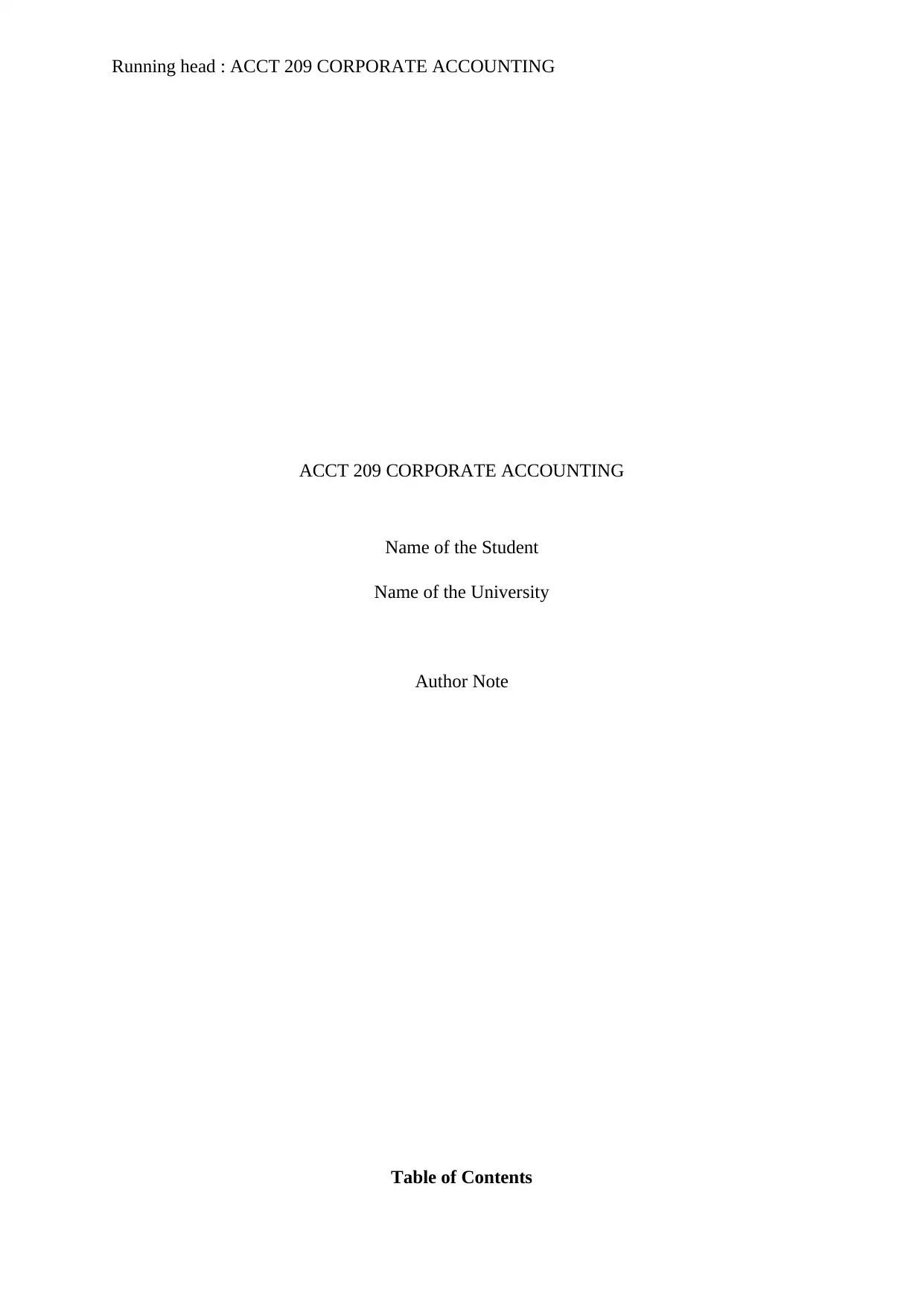
Running head : ACCT 209 CORPORATE ACCOUNTING
ACCT 209 CORPORATE ACCOUNTING
Name of the Student
Name of the University
Author Note
Table of Contents
ACCT 209 CORPORATE ACCOUNTING
Name of the Student
Name of the University
Author Note
Table of Contents
Paraphrase This Document
Need a fresh take? Get an instant paraphrase of this document with our AI Paraphraser

1
ACCT 209 CORPORATE ACCOUNTING
Introduction................................................................................................................................2
ACCT 209 CORPORATE ACCOUNTING
Introduction................................................................................................................................2
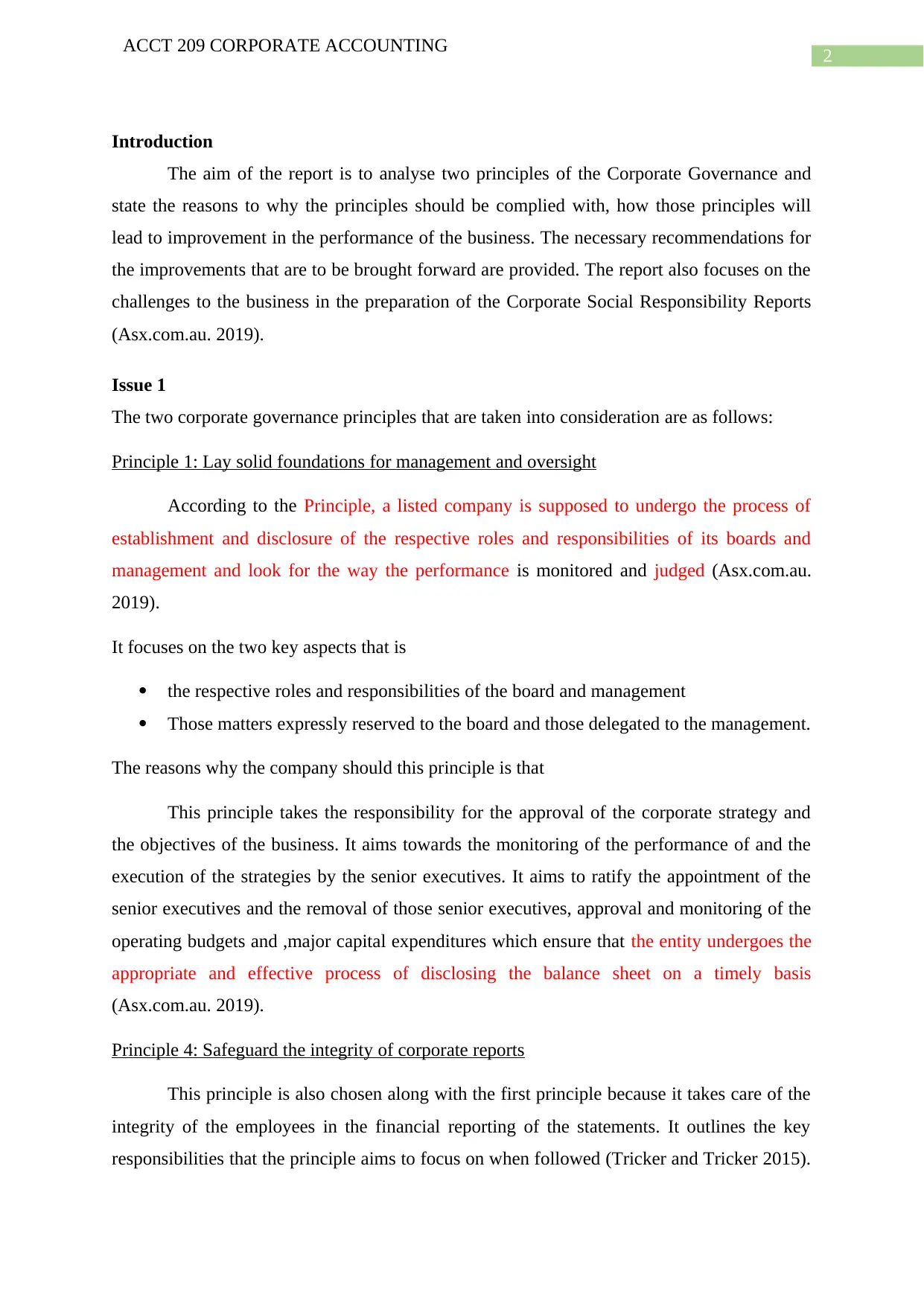
2
ACCT 209 CORPORATE ACCOUNTING
Introduction
The aim of the report is to analyse two principles of the Corporate Governance and
state the reasons to why the principles should be complied with, how those principles will
lead to improvement in the performance of the business. The necessary recommendations for
the improvements that are to be brought forward are provided. The report also focuses on the
challenges to the business in the preparation of the Corporate Social Responsibility Reports
(Asx.com.au. 2019).
Issue 1
The two corporate governance principles that are taken into consideration are as follows:
Principle 1: Lay solid foundations for management and oversight
According to the Principle, a listed company is supposed to undergo the process of
establishment and disclosure of the respective roles and responsibilities of its boards and
management and look for the way the performance is monitored and judged (Asx.com.au.
2019).
It focuses on the two key aspects that is
the respective roles and responsibilities of the board and management
Those matters expressly reserved to the board and those delegated to the management.
The reasons why the company should this principle is that
This principle takes the responsibility for the approval of the corporate strategy and
the objectives of the business. It aims towards the monitoring of the performance of and the
execution of the strategies by the senior executives. It aims to ratify the appointment of the
senior executives and the removal of those senior executives, approval and monitoring of the
operating budgets and ,major capital expenditures which ensure that the entity undergoes the
appropriate and effective process of disclosing the balance sheet on a timely basis
(Asx.com.au. 2019).
Principle 4: Safeguard the integrity of corporate reports
This principle is also chosen along with the first principle because it takes care of the
integrity of the employees in the financial reporting of the statements. It outlines the key
responsibilities that the principle aims to focus on when followed (Tricker and Tricker 2015).
ACCT 209 CORPORATE ACCOUNTING
Introduction
The aim of the report is to analyse two principles of the Corporate Governance and
state the reasons to why the principles should be complied with, how those principles will
lead to improvement in the performance of the business. The necessary recommendations for
the improvements that are to be brought forward are provided. The report also focuses on the
challenges to the business in the preparation of the Corporate Social Responsibility Reports
(Asx.com.au. 2019).
Issue 1
The two corporate governance principles that are taken into consideration are as follows:
Principle 1: Lay solid foundations for management and oversight
According to the Principle, a listed company is supposed to undergo the process of
establishment and disclosure of the respective roles and responsibilities of its boards and
management and look for the way the performance is monitored and judged (Asx.com.au.
2019).
It focuses on the two key aspects that is
the respective roles and responsibilities of the board and management
Those matters expressly reserved to the board and those delegated to the management.
The reasons why the company should this principle is that
This principle takes the responsibility for the approval of the corporate strategy and
the objectives of the business. It aims towards the monitoring of the performance of and the
execution of the strategies by the senior executives. It aims to ratify the appointment of the
senior executives and the removal of those senior executives, approval and monitoring of the
operating budgets and ,major capital expenditures which ensure that the entity undergoes the
appropriate and effective process of disclosing the balance sheet on a timely basis
(Asx.com.au. 2019).
Principle 4: Safeguard the integrity of corporate reports
This principle is also chosen along with the first principle because it takes care of the
integrity of the employees in the financial reporting of the statements. It outlines the key
responsibilities that the principle aims to focus on when followed (Tricker and Tricker 2015).
⊘ This is a preview!⊘
Do you want full access?
Subscribe today to unlock all pages.

Trusted by 1+ million students worldwide

3
ACCT 209 CORPORATE ACCOUNTING
It focuses on review and approval of the internal audit plans, financial reports and a review of
how effectively the company adheres to the risk management functions. The three Non-
executive Directors and a majority of the independent functions constitute the audit
committee. The committee Chairman has to be a director who is independent in his thought
procedure with respect to the company.
Issue 2
The management of a company is considered as one of the essential component of a
business entity. It is the prime responsibility of the entity to make sure that the management
of the company works well with utmost level of integrity, responsibility, so that it sets a good
example to its rival companies about its listing in the one of the best companies. This
principle aims towards the monitoring of the performance of and the execution of the
strategies by the senior executives. This principle will improve the business performance in
the sense that if the management performs with utmost integrity, it will lead to the
improvement of the performance of the company in terms of the formation of the rules and
regulations of the business (Du Plessis Hargovan and Harris 2018).
The fourth principle would be helpful in the performance of the company in the sense
that the auditors are considered very crucial part in the business entity. They have a crucial
role to play as they give judgements on the fairness of the financial statements of the
company. The auditors keep a track of all types of operations that are carried on in the
business entity. They make sure that there is no whistle blowing in the business, or else they
will make all sorts of efforts to prove that through their judgement. Hence, this principle is to
be followed so that the internal and continuous auditors make sure that there is proper
integrity from the side of the auditor in the provision of the judgement on the fairness of the
financial statements of the company.
Issue 3
The principles of Corporate Governance are derived from the positive accounting
theories. Accounting theory refers to the group of assumptions, frameworks, and the
methodologies that are used for the purpose of study and for the purpose of applying the
financial reporting systems. The accounting theory study involves a review of the foundations
from the history of the practices of accountancy as well as the manner in which the
accounting practices are varied and added to the regulatory framework. It administers the
financial statements and the reporting of the financial statements to the concerned authorities.
ACCT 209 CORPORATE ACCOUNTING
It focuses on review and approval of the internal audit plans, financial reports and a review of
how effectively the company adheres to the risk management functions. The three Non-
executive Directors and a majority of the independent functions constitute the audit
committee. The committee Chairman has to be a director who is independent in his thought
procedure with respect to the company.
Issue 2
The management of a company is considered as one of the essential component of a
business entity. It is the prime responsibility of the entity to make sure that the management
of the company works well with utmost level of integrity, responsibility, so that it sets a good
example to its rival companies about its listing in the one of the best companies. This
principle aims towards the monitoring of the performance of and the execution of the
strategies by the senior executives. This principle will improve the business performance in
the sense that if the management performs with utmost integrity, it will lead to the
improvement of the performance of the company in terms of the formation of the rules and
regulations of the business (Du Plessis Hargovan and Harris 2018).
The fourth principle would be helpful in the performance of the company in the sense
that the auditors are considered very crucial part in the business entity. They have a crucial
role to play as they give judgements on the fairness of the financial statements of the
company. The auditors keep a track of all types of operations that are carried on in the
business entity. They make sure that there is no whistle blowing in the business, or else they
will make all sorts of efforts to prove that through their judgement. Hence, this principle is to
be followed so that the internal and continuous auditors make sure that there is proper
integrity from the side of the auditor in the provision of the judgement on the fairness of the
financial statements of the company.
Issue 3
The principles of Corporate Governance are derived from the positive accounting
theories. Accounting theory refers to the group of assumptions, frameworks, and the
methodologies that are used for the purpose of study and for the purpose of applying the
financial reporting systems. The accounting theory study involves a review of the foundations
from the history of the practices of accountancy as well as the manner in which the
accounting practices are varied and added to the regulatory framework. It administers the
financial statements and the reporting of the financial statements to the concerned authorities.
Paraphrase This Document
Need a fresh take? Get an instant paraphrase of this document with our AI Paraphraser
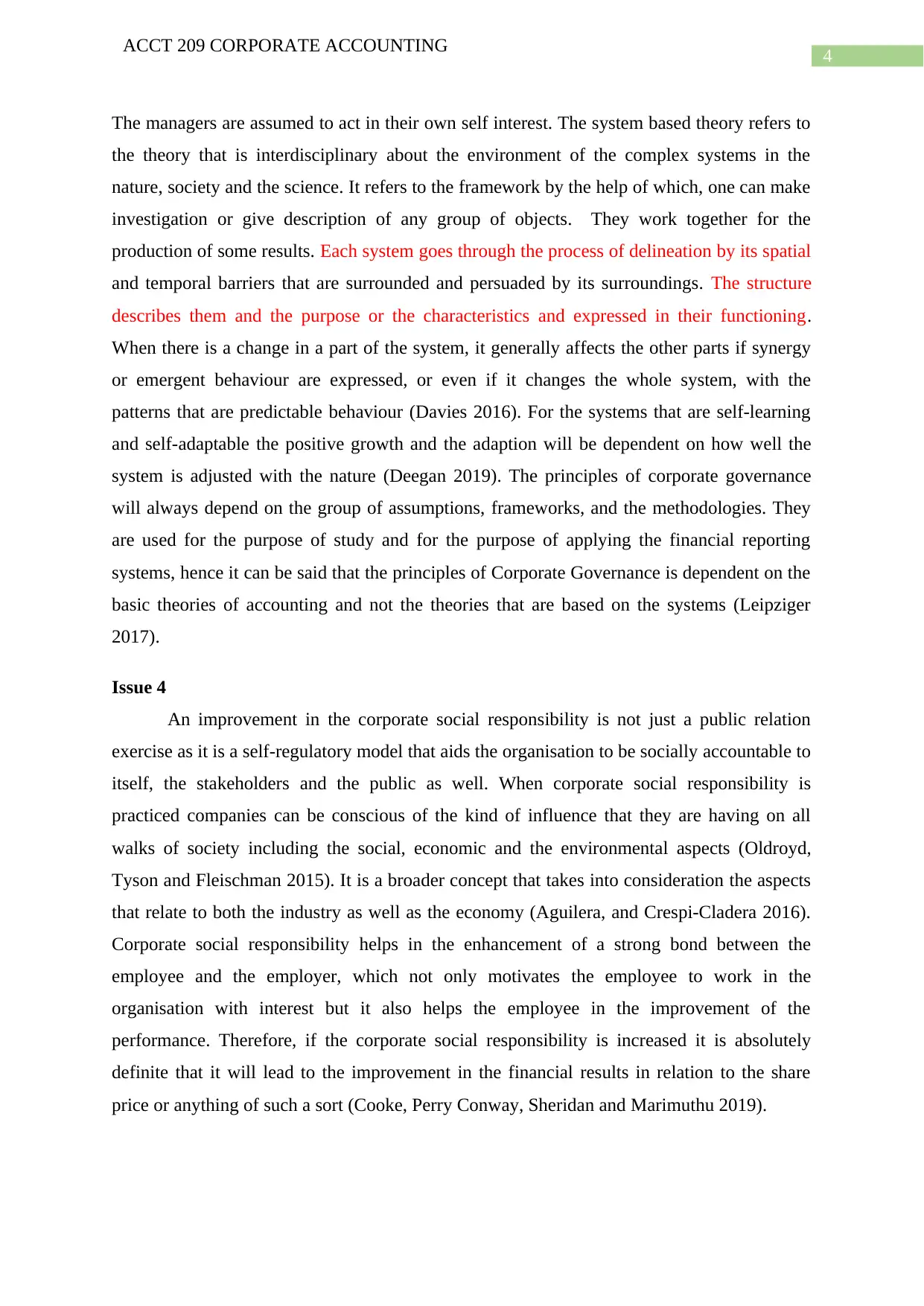
4
ACCT 209 CORPORATE ACCOUNTING
The managers are assumed to act in their own self interest. The system based theory refers to
the theory that is interdisciplinary about the environment of the complex systems in the
nature, society and the science. It refers to the framework by the help of which, one can make
investigation or give description of any group of objects. They work together for the
production of some results. Each system goes through the process of delineation by its spatial
and temporal barriers that are surrounded and persuaded by its surroundings. The structure
describes them and the purpose or the characteristics and expressed in their functioning.
When there is a change in a part of the system, it generally affects the other parts if synergy
or emergent behaviour are expressed, or even if it changes the whole system, with the
patterns that are predictable behaviour (Davies 2016). For the systems that are self-learning
and self-adaptable the positive growth and the adaption will be dependent on how well the
system is adjusted with the nature (Deegan 2019). The principles of corporate governance
will always depend on the group of assumptions, frameworks, and the methodologies. They
are used for the purpose of study and for the purpose of applying the financial reporting
systems, hence it can be said that the principles of Corporate Governance is dependent on the
basic theories of accounting and not the theories that are based on the systems (Leipziger
2017).
Issue 4
An improvement in the corporate social responsibility is not just a public relation
exercise as it is a self-regulatory model that aids the organisation to be socially accountable to
itself, the stakeholders and the public as well. When corporate social responsibility is
practiced companies can be conscious of the kind of influence that they are having on all
walks of society including the social, economic and the environmental aspects (Oldroyd,
Tyson and Fleischman 2015). It is a broader concept that takes into consideration the aspects
that relate to both the industry as well as the economy (Aguilera, and Crespi-Cladera 2016).
Corporate social responsibility helps in the enhancement of a strong bond between the
employee and the employer, which not only motivates the employee to work in the
organisation with interest but it also helps the employee in the improvement of the
performance. Therefore, if the corporate social responsibility is increased it is absolutely
definite that it will lead to the improvement in the financial results in relation to the share
price or anything of such a sort (Cooke, Perry Conway, Sheridan and Marimuthu 2019).
ACCT 209 CORPORATE ACCOUNTING
The managers are assumed to act in their own self interest. The system based theory refers to
the theory that is interdisciplinary about the environment of the complex systems in the
nature, society and the science. It refers to the framework by the help of which, one can make
investigation or give description of any group of objects. They work together for the
production of some results. Each system goes through the process of delineation by its spatial
and temporal barriers that are surrounded and persuaded by its surroundings. The structure
describes them and the purpose or the characteristics and expressed in their functioning.
When there is a change in a part of the system, it generally affects the other parts if synergy
or emergent behaviour are expressed, or even if it changes the whole system, with the
patterns that are predictable behaviour (Davies 2016). For the systems that are self-learning
and self-adaptable the positive growth and the adaption will be dependent on how well the
system is adjusted with the nature (Deegan 2019). The principles of corporate governance
will always depend on the group of assumptions, frameworks, and the methodologies. They
are used for the purpose of study and for the purpose of applying the financial reporting
systems, hence it can be said that the principles of Corporate Governance is dependent on the
basic theories of accounting and not the theories that are based on the systems (Leipziger
2017).
Issue 4
An improvement in the corporate social responsibility is not just a public relation
exercise as it is a self-regulatory model that aids the organisation to be socially accountable to
itself, the stakeholders and the public as well. When corporate social responsibility is
practiced companies can be conscious of the kind of influence that they are having on all
walks of society including the social, economic and the environmental aspects (Oldroyd,
Tyson and Fleischman 2015). It is a broader concept that takes into consideration the aspects
that relate to both the industry as well as the economy (Aguilera, and Crespi-Cladera 2016).
Corporate social responsibility helps in the enhancement of a strong bond between the
employee and the employer, which not only motivates the employee to work in the
organisation with interest but it also helps the employee in the improvement of the
performance. Therefore, if the corporate social responsibility is increased it is absolutely
definite that it will lead to the improvement in the financial results in relation to the share
price or anything of such a sort (Cooke, Perry Conway, Sheridan and Marimuthu 2019).
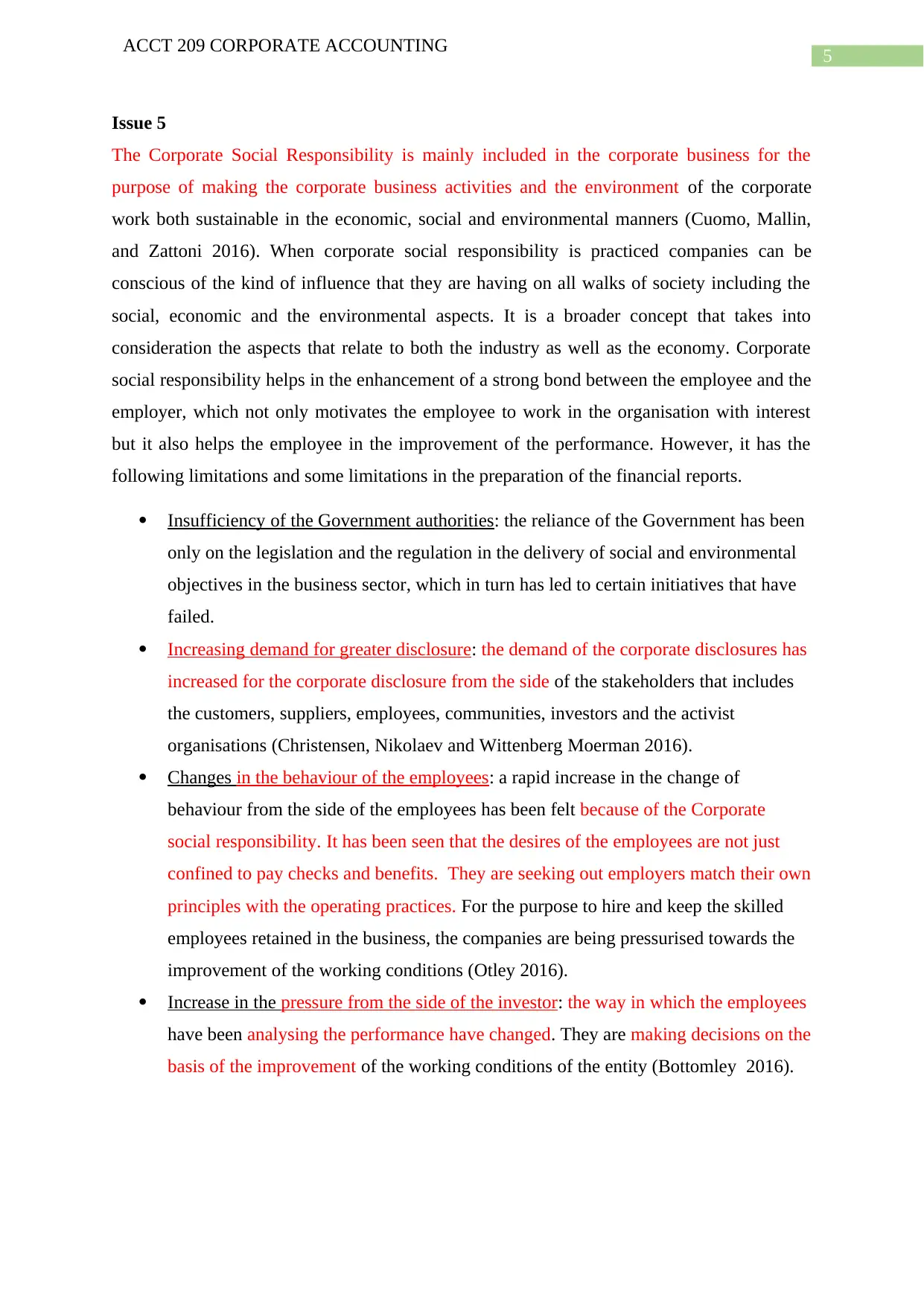
5
ACCT 209 CORPORATE ACCOUNTING
Issue 5
The Corporate Social Responsibility is mainly included in the corporate business for the
purpose of making the corporate business activities and the environment of the corporate
work both sustainable in the economic, social and environmental manners (Cuomo, Mallin,
and Zattoni 2016). When corporate social responsibility is practiced companies can be
conscious of the kind of influence that they are having on all walks of society including the
social, economic and the environmental aspects. It is a broader concept that takes into
consideration the aspects that relate to both the industry as well as the economy. Corporate
social responsibility helps in the enhancement of a strong bond between the employee and the
employer, which not only motivates the employee to work in the organisation with interest
but it also helps the employee in the improvement of the performance. However, it has the
following limitations and some limitations in the preparation of the financial reports.
Insufficiency of the Government authorities: the reliance of the Government has been
only on the legislation and the regulation in the delivery of social and environmental
objectives in the business sector, which in turn has led to certain initiatives that have
failed.
Increasing demand for greater disclosure: the demand of the corporate disclosures has
increased for the corporate disclosure from the side of the stakeholders that includes
the customers, suppliers, employees, communities, investors and the activist
organisations (Christensen, Nikolaev and Wittenberg Moerman 2016).
Changes in the behaviour of the employees: a rapid increase in the change of
behaviour from the side of the employees has been felt because of the Corporate
social responsibility. It has been seen that the desires of the employees are not just
confined to pay checks and benefits. They are seeking out employers match their own
principles with the operating practices. For the purpose to hire and keep the skilled
employees retained in the business, the companies are being pressurised towards the
improvement of the working conditions (Otley 2016).
Increase in the pressure from the side of the investor: the way in which the employees
have been analysing the performance have changed. They are making decisions on the
basis of the improvement of the working conditions of the entity (Bottomley 2016).
ACCT 209 CORPORATE ACCOUNTING
Issue 5
The Corporate Social Responsibility is mainly included in the corporate business for the
purpose of making the corporate business activities and the environment of the corporate
work both sustainable in the economic, social and environmental manners (Cuomo, Mallin,
and Zattoni 2016). When corporate social responsibility is practiced companies can be
conscious of the kind of influence that they are having on all walks of society including the
social, economic and the environmental aspects. It is a broader concept that takes into
consideration the aspects that relate to both the industry as well as the economy. Corporate
social responsibility helps in the enhancement of a strong bond between the employee and the
employer, which not only motivates the employee to work in the organisation with interest
but it also helps the employee in the improvement of the performance. However, it has the
following limitations and some limitations in the preparation of the financial reports.
Insufficiency of the Government authorities: the reliance of the Government has been
only on the legislation and the regulation in the delivery of social and environmental
objectives in the business sector, which in turn has led to certain initiatives that have
failed.
Increasing demand for greater disclosure: the demand of the corporate disclosures has
increased for the corporate disclosure from the side of the stakeholders that includes
the customers, suppliers, employees, communities, investors and the activist
organisations (Christensen, Nikolaev and Wittenberg Moerman 2016).
Changes in the behaviour of the employees: a rapid increase in the change of
behaviour from the side of the employees has been felt because of the Corporate
social responsibility. It has been seen that the desires of the employees are not just
confined to pay checks and benefits. They are seeking out employers match their own
principles with the operating practices. For the purpose to hire and keep the skilled
employees retained in the business, the companies are being pressurised towards the
improvement of the working conditions (Otley 2016).
Increase in the pressure from the side of the investor: the way in which the employees
have been analysing the performance have changed. They are making decisions on the
basis of the improvement of the working conditions of the entity (Bottomley 2016).
⊘ This is a preview!⊘
Do you want full access?
Subscribe today to unlock all pages.

Trusted by 1+ million students worldwide
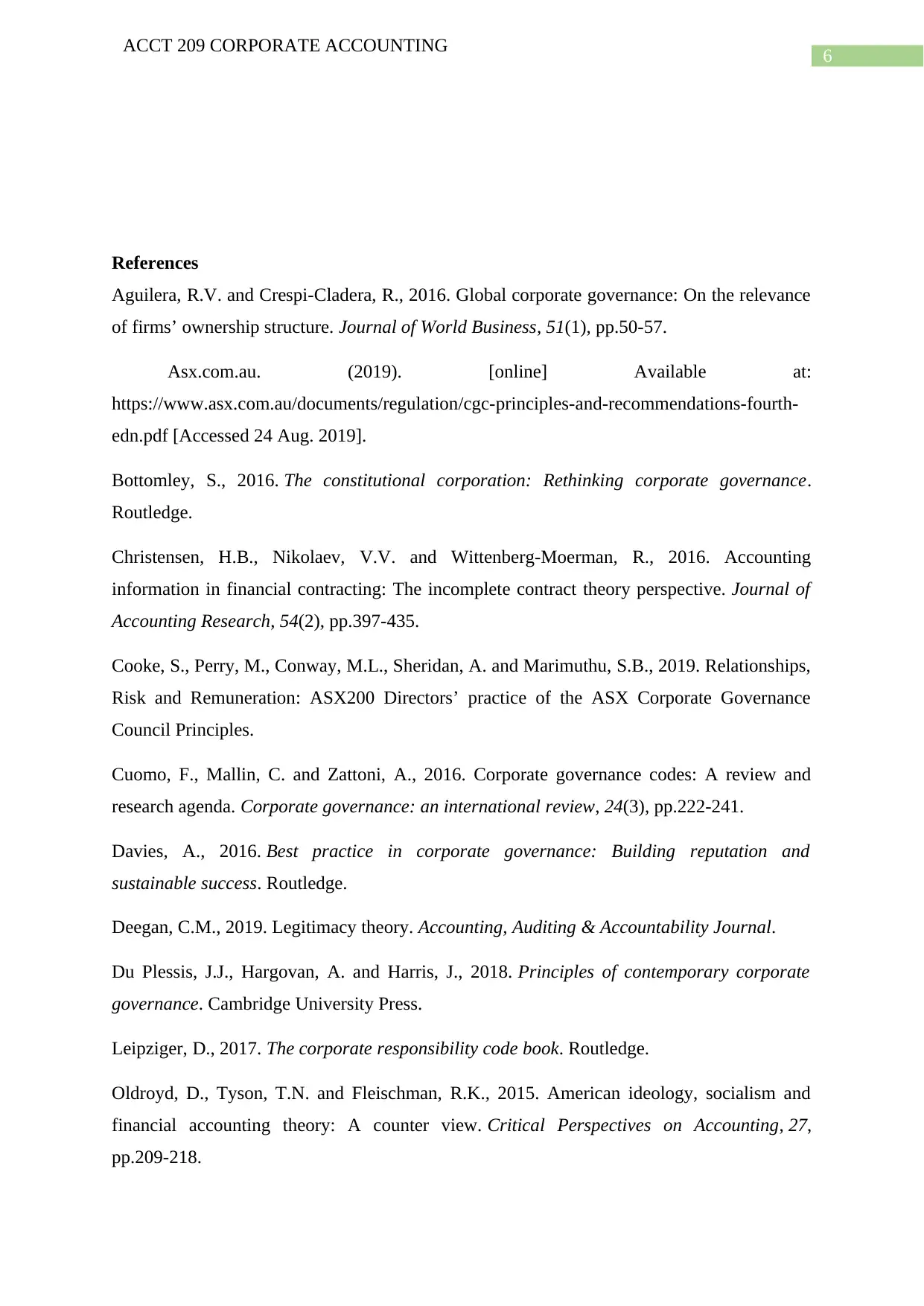
6
ACCT 209 CORPORATE ACCOUNTING
References
Aguilera, R.V. and Crespi-Cladera, R., 2016. Global corporate governance: On the relevance
of firms’ ownership structure. Journal of World Business, 51(1), pp.50-57.
Asx.com.au. (2019). [online] Available at:
https://www.asx.com.au/documents/regulation/cgc-principles-and-recommendations-fourth-
edn.pdf [Accessed 24 Aug. 2019].
Bottomley, S., 2016. The constitutional corporation: Rethinking corporate governance.
Routledge.
Christensen, H.B., Nikolaev, V.V. and Wittenberg‐Moerman, R., 2016. Accounting
information in financial contracting: The incomplete contract theory perspective. Journal of
Accounting Research, 54(2), pp.397-435.
Cooke, S., Perry, M., Conway, M.L., Sheridan, A. and Marimuthu, S.B., 2019. Relationships,
Risk and Remuneration: ASX200 Directors’ practice of the ASX Corporate Governance
Council Principles.
Cuomo, F., Mallin, C. and Zattoni, A., 2016. Corporate governance codes: A review and
research agenda. Corporate governance: an international review, 24(3), pp.222-241.
Davies, A., 2016. Best practice in corporate governance: Building reputation and
sustainable success. Routledge.
Deegan, C.M., 2019. Legitimacy theory. Accounting, Auditing & Accountability Journal.
Du Plessis, J.J., Hargovan, A. and Harris, J., 2018. Principles of contemporary corporate
governance. Cambridge University Press.
Leipziger, D., 2017. The corporate responsibility code book. Routledge.
Oldroyd, D., Tyson, T.N. and Fleischman, R.K., 2015. American ideology, socialism and
financial accounting theory: A counter view. Critical Perspectives on Accounting, 27,
pp.209-218.
ACCT 209 CORPORATE ACCOUNTING
References
Aguilera, R.V. and Crespi-Cladera, R., 2016. Global corporate governance: On the relevance
of firms’ ownership structure. Journal of World Business, 51(1), pp.50-57.
Asx.com.au. (2019). [online] Available at:
https://www.asx.com.au/documents/regulation/cgc-principles-and-recommendations-fourth-
edn.pdf [Accessed 24 Aug. 2019].
Bottomley, S., 2016. The constitutional corporation: Rethinking corporate governance.
Routledge.
Christensen, H.B., Nikolaev, V.V. and Wittenberg‐Moerman, R., 2016. Accounting
information in financial contracting: The incomplete contract theory perspective. Journal of
Accounting Research, 54(2), pp.397-435.
Cooke, S., Perry, M., Conway, M.L., Sheridan, A. and Marimuthu, S.B., 2019. Relationships,
Risk and Remuneration: ASX200 Directors’ practice of the ASX Corporate Governance
Council Principles.
Cuomo, F., Mallin, C. and Zattoni, A., 2016. Corporate governance codes: A review and
research agenda. Corporate governance: an international review, 24(3), pp.222-241.
Davies, A., 2016. Best practice in corporate governance: Building reputation and
sustainable success. Routledge.
Deegan, C.M., 2019. Legitimacy theory. Accounting, Auditing & Accountability Journal.
Du Plessis, J.J., Hargovan, A. and Harris, J., 2018. Principles of contemporary corporate
governance. Cambridge University Press.
Leipziger, D., 2017. The corporate responsibility code book. Routledge.
Oldroyd, D., Tyson, T.N. and Fleischman, R.K., 2015. American ideology, socialism and
financial accounting theory: A counter view. Critical Perspectives on Accounting, 27,
pp.209-218.
Paraphrase This Document
Need a fresh take? Get an instant paraphrase of this document with our AI Paraphraser
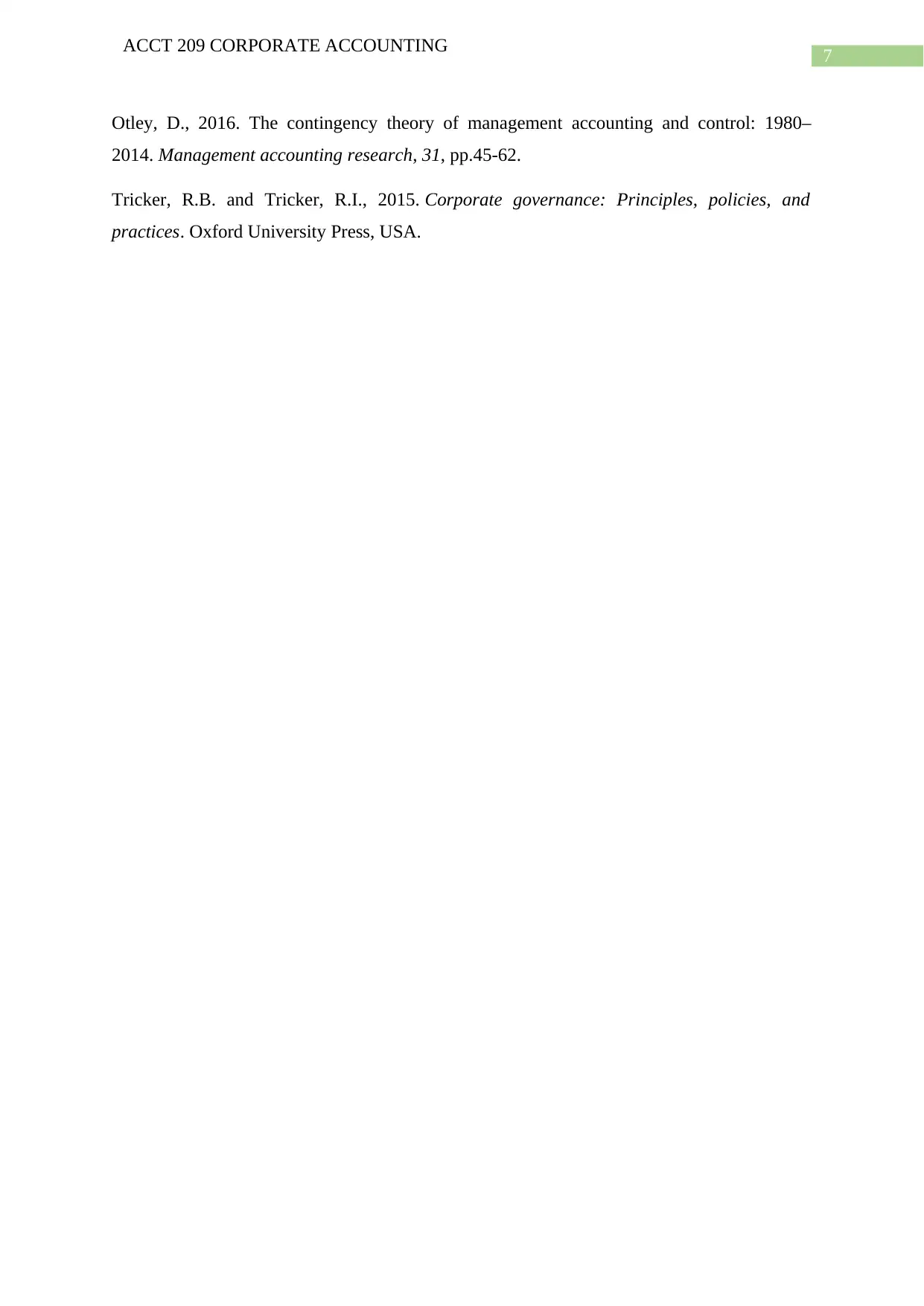
7
ACCT 209 CORPORATE ACCOUNTING
Otley, D., 2016. The contingency theory of management accounting and control: 1980–
2014. Management accounting research, 31, pp.45-62.
Tricker, R.B. and Tricker, R.I., 2015. Corporate governance: Principles, policies, and
practices. Oxford University Press, USA.
ACCT 209 CORPORATE ACCOUNTING
Otley, D., 2016. The contingency theory of management accounting and control: 1980–
2014. Management accounting research, 31, pp.45-62.
Tricker, R.B. and Tricker, R.I., 2015. Corporate governance: Principles, policies, and
practices. Oxford University Press, USA.
1 out of 8
Related Documents
Your All-in-One AI-Powered Toolkit for Academic Success.
+13062052269
info@desklib.com
Available 24*7 on WhatsApp / Email
![[object Object]](/_next/static/media/star-bottom.7253800d.svg)
Unlock your academic potential
Copyright © 2020–2025 A2Z Services. All Rights Reserved. Developed and managed by ZUCOL.





